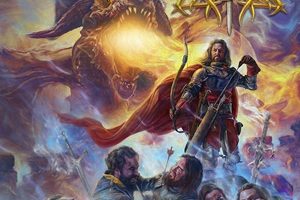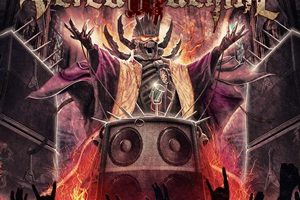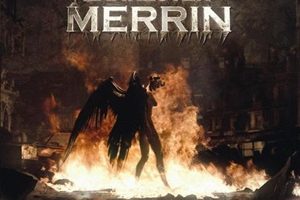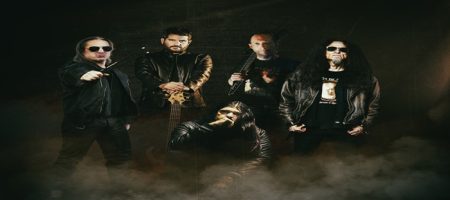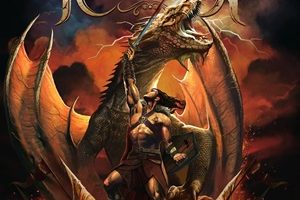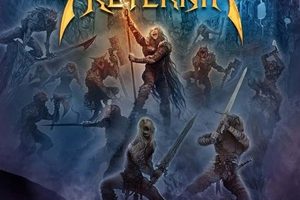Blind Guardian – Twilight Tales Never Fade
Sunday, 15th February 2015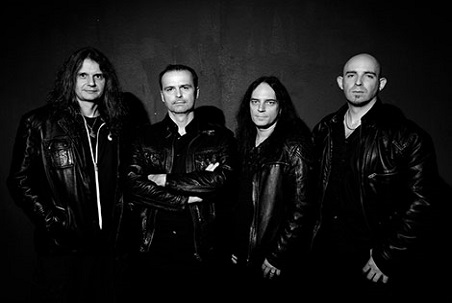
Because they come every four or five years, a Blind Guardian album should rightfully be treated as an event. They’re well past the point of having to follow the traditional bi-annual release schedule to climb the Euro metal ladder; they did that in the 90s, and it went quite well, thank you very much. But now, the real challenge for the Guardians is just that: Finding a way to challenge their fanbase, something that their new Beyond the Red Mirror (Nuclear Blast) accomplishes in spades. The amount of craftsmanship and detail that went into the album is monumental, resulting in a suitably epic and broad listening experience, with no less than four jams (“The Ninth Wave,” “Twilight of the Gods,” “The Throne,” and “Grand Parade”) hitting the mark as instant BG classics. Plus, the band has revisited some of the concepts found on their unbeatable 1995 album Imaginations from the Other Side, providing a proper tie to a storyline that is a favorite among fans.
Here to give DR the low-down is vocalist Hansi Kürsch, a man of infinite politeness, who was kind enough to field our questions about the band’s newly disputed bass player position (last month, they announced Barend Courbois as their new session/touring bassist), the new album, and, those utterly fantastic days of the 90s, where the Guardians of the Blind hurdled over every other German power metal band to the pole position they’ve yet to vacate since. Read on…
Dead Rhetoric: Have to start with this: It’s always been the four of you guys, now you’re a quintet. What made you take the leap and add Barend to the band?
Hansi Kürsch: You know what? It was just a misunderstanding in general. It was just meant to be an introduction for people who wanted to know something about the bassist. We thought, “We’ll use this opportunity to introduce him via our Facebook and homepage.” People misunderstood. He has the same status as [former session/touring bassist] Oliver Holzwarth. It was a complete misunderstanding and I was like, “Something is going wrong here!” Jason, our webmaster, was completely irritated and confused by this as well. I misunderstood him and said, “Of course we’re going to promote him and introduce him.” He was somehow thinking about the confusion which might be what created it, but I didn’t see it, so I said, “Spread the news. All good.” It was obvious to me that he’s not the fifth band member, and he’s fine with his status, like Oliver was. We don’t need that. Even though I doubt I’m going to play the bass again, it’s still the four of us.
Dead Rhetoric: I’m glad you cleared that up. Amazing how easily things get misconstrued on the internet.
Kürsch: The internet is having the lead in confusing people and making more of a story than there is. I read the story over and over again, and we just announced Barend, or “Bear” as we call him, has the same status as Oliver. He played the bass on the new album, and he is also taking part in our concerts. It was just an introduction and yes, you can consider him the Blind Guardian bass player, as (live member) Michael Schüren is considered our keyboardist. I don’t have a problem with that in general, but it’s just amazing to see how things spread quickly, and how they are misunderstood, and what people are creating out of it. Some people start complaining about it, and even if he was the fifth member, that’s our decision. But he’s not. [laughs] If we feel so, we can do so. Why not? What’s the problem with it?
Dead Rhetoric: Do you miss playing the bass? You have to on the some of the longer solos that have a lot of solos.
Kürsch: No. I would love to have a little more breaks. [laughs] The point is there is so much vocal music going on while onstage that I’m fine with any break that I can get. Even if I still have to entertain people to an extent during these breaks because I can start breathing, which is sometimes not the case when I have to do vocals for 64 bars with small breaks in there, and then there are range changes, and I have to do them immediately. I’m really happy with any break I can get. The truth is, even in the parts where I would not sing, the music has become so complicated, and to follow the drums would be a nightmare for me. I’m just fine not having anything to do with it onstage.
Funny enough, when I started working on “Miracle Machine,” I grabbed the bass in the studio and did the basic chords on the bass guitar and did my vocals to that. When Charlie [Bauerfeind, producer] has heard the first version or 45 seconds, he said, “Well, we might stay with the bass.” Of course, Bear would have played it, but the idea was to have something different completely from any sort of ballad we have done in the bass. The first intention was to introduce Bare as the “picky” bass player who supports the vocals in that song, but at the very end, I felt more comfortable with piano. But yeah, I took the bass there and it helped with creating the song. I’m not the best bass player anymore, and to get on the level of the other guys, it would take forever.
Dead Rhetoric: Was Imaginations the last album you played bass?
Kürsch: Yes. Even then it was a big problem because it turned out to be more difficult than expected. This was the case with Somewhere [in Time], but especially when I was doing the stuff I thought, “Doing the vocals live and the bass, I might get lost.” This has been the case sometimes on the Imaginations tour, and this made me come up with a drastic decision like this.
Dead Rhetoric: To that point, do you remember making the switch of not having the bass in your hands to just being the vocalist?
Kürsch: Yes! It’s still a learning process. I’m playing with it and I’m coping with the differences, especially when I started doing music. I never considered myself to be a front, front man. We were this four-piece band, and I was relating myself to people like James Hetfield than Bruce Dickinson when it came to performing onstage, so there was a big difference when I entered the stage for the first time without a bass guitar. I needed to learn how to work with it. My problems, especially on the Nightfall tour was that I went on that touring situation without having any time to rehearse at home in general. We were doing the album, then promotion, and from promotion we were forced to go right on tour. In that particular case, I didn’t have the chance to think about what I would do onstage. So it was a big change for me and I’ve learned my lessons. [laughs]
Dead Rhetoric: You’re never going to be that crazed frontman like Dickinson, jumping over things, but you’ve assimilated yourself nicely.
Kürsch: The point was to figure out what would be my role. I’m pretty good at moderating things. I sort of have a weird sense of humor, and if I’m able to deliver that onstage, which is not always the case because I haven’t prepared anything. I go onstage without knowing what to say and where the journey is going to lead me. If I find that spot, I feel very comfortable and I can do a decent job. If someone asked me to start dancing, I would be in a certain dilemma again. [laughs]
Pages: 1 2











